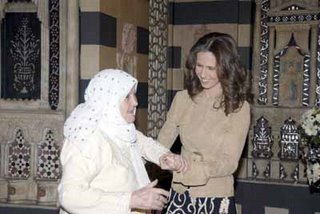ZamanOnline
http://www.zaman.com/?bl=columnists&alt=&trh=20060504&hn=32764
The very noble posture of the young, elegantly beautiful Syrian first lady, Asma al-Assad, at the breakfast meeting reminded me of Nizar Kabbani's words.
Kabbani, studying at Damascus University, asks, "Is it the Syrian woman who gives her beauty to Syria, or is it Syria that gives her an inner beauty, nobility and femininity?"
As Asma al-Assad was born and raised in London, she is often asked just how much she has integrated into Syrian culture. The first lady said while she was living in London she went to Syria every summer and never found Syria or its culture strange. She described herself as embodying British-Western culture. She emphasized they have also started in Syria the kind of revolution developing countries are currently experiencing. She was mostly impressed by the fashion show she watched in Istanbul, and said that the striking synthesis of the traditional and modern in the fashion world could be applied to real life. She firmly believed the traditional and modern will unite.
"Turkey is a very good model for us," Mrs. Assad said, stressing that Turkey with its synthesis is a role model for the region. The greatest obstacles facing women living in freedom and independently are the customs and traditions, she stated in perfect English. I understood from the conversation that the traditions cannot be overcome overnight, the "Majalla" or Ottoman civil code, exists, and there is no right to divorce.
Syria does not only lead Turkey by 10.4 percent in the number of women present in Parliament, it also overwhelmingly leads Turkey in women involvement in local politics. However, the woman is identified with her family not as an individual. The concepts of family and honor are binding for women in Arab culture. Though Mrs. Assad said, "We keep asking for more, and we want more progress," it is obvious that the women involved in social and political events are all from the upper class. No woman from the middle or lower class can easily break through the invisible barriers. It is known that there were no civil society organizations (CSOs) until three years ago in Syria, where there is tight state control. Mrs. Assad, who heads the first civil society organization that was established by the state, is also the head of the "independent" CSOs, most of them established under state control.
Mrs. Assad, the first first lady to drive a car in Damascus, is very brave and strong. Her first CSO is FIRDOS, an organization that gives support to rural women. As a matter of fact, being strong and self-confident are the strongest legs of her viewpoint on life. That was her emphasis when she said, "I am a strong and self-confident woman." I asked her "Are you free?" as she said, "A self-confident woman is independent." "Apart from my responsibilities, I have a normal life and I live in freedom in this area."
She talked about the importance of relations with Turkey, and said people keep a close eye on the leaders' deeds.
The word "feminism" in questions asked on feminism, headscarf and honor killings made her laugh slightly. I think this reaction stemmed from the conceptual structure of feminism in the East. Mrs. Assad tried to explain that there is individualism and an individual behind feminism, but the fact that Syrian culture is based on the family embraces the cultural structure with a different understanding. I listened to her without forgetting the 100 cases of honor killings that appeared in newspapers in 2000-2003. As I was listening to the first lady, I thought about the very colorful and diverse ethnic structure of Syria, where 30 percent of the population are Nusayris. The woman's role as a mother, sister, wife and aunt is important, not her individual rights and demands. 396 of the 767 business women in Syria are entrepreneurs who have established their own business. The newly established SYEA is the first association founded by young entrepreneurs.
In other words, this is the first step in economic development; a person who broke the taboo on violence against women. Last year, she started a project under the auspices of the United Nations Development Fund for Women. When she said, "Syrian women are eager and ambitious," she made a realistic point, in my opinion. "Women are in secondary positions in the society, and the customs and traditions crush them under the mask of religion. Religion is a very private and individual matter," she insisted. "What is essential is the Holy Qur'an, not practical religion, and we must look at this," Mrs. Assad said, adding that she also believed in the importance of reaching a consensus with religious scholars. Hence, they have launched an educational project to make religious scholars work for the betterment of women. This is very important, in my opinion, to get women involved through persuasion and education -- not by excluding them...
"The 20th century was that of men, and the 21st century will be that of women," she said as she was shaking hands with the participants. I believe a woman's hand should reach out to the Middle East.




















.png)




0 comments:
Post a Comment